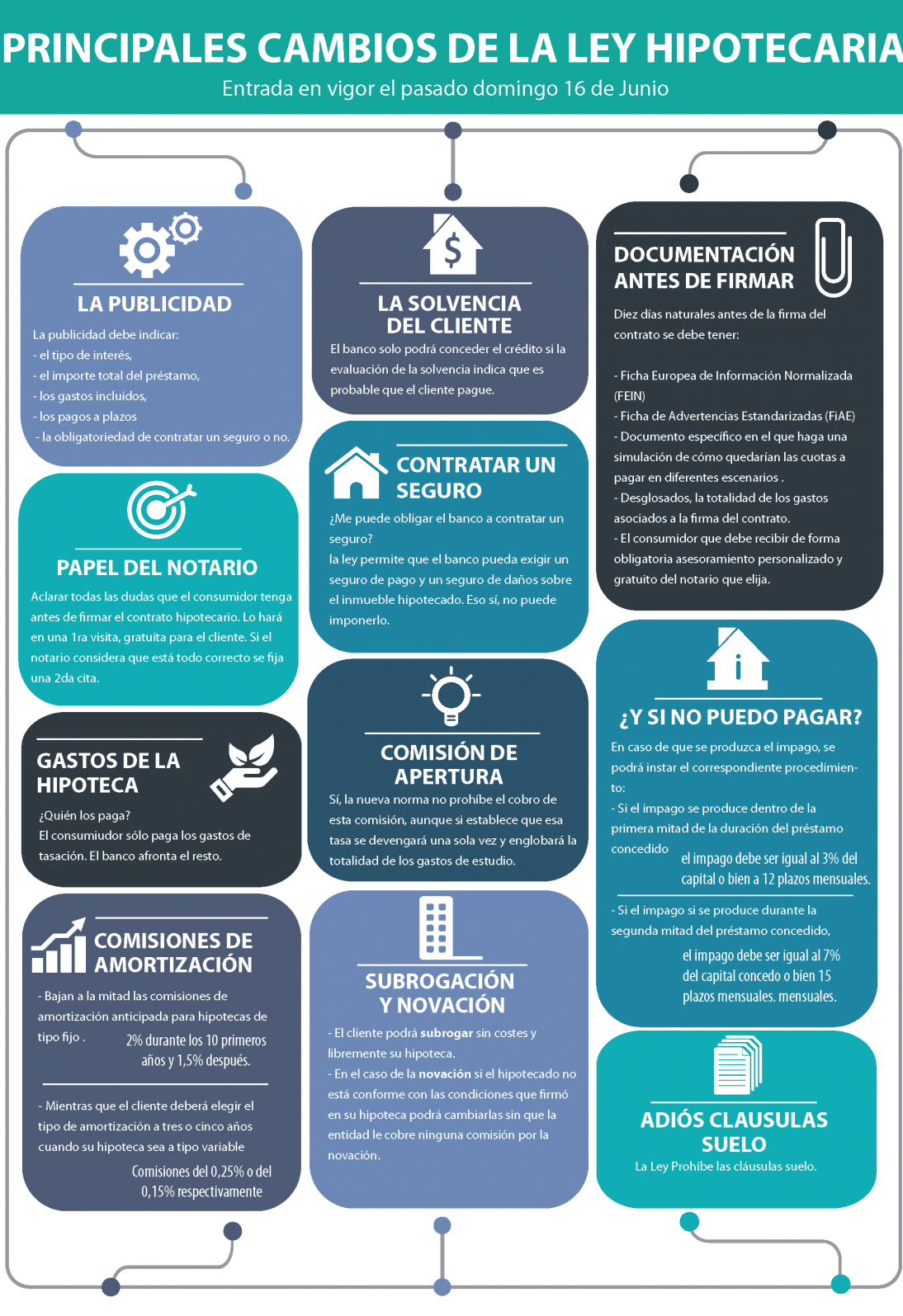What are the main changes in the new Real Estate Credit Law, better known as the Mortgage Law?
The New Mortgage Law, definitively approved by the Congress of Deputies last February, entrOh in force this Sunday 16 of June, three months after its publication in the Official State Gazette (BOE).
The new law aims to give more protection to consumers.
First step: Advertising
The law establishes, for a start, that advertising must indicate, among other points, The interest rate, The total amount of the loan, The expenses included, installment payments and the obligation to hire insurance or not.
Second step: Customer solvency
The bank You can only grant credit If the evaluation of the solvency indicates that The client is likely to pay. After that, The bank can repeal the mortgage, If he does, You will have to inform in writing and without delay to the consumer and its guarantee, and motivate why.
Before signing, What documentation should I have?
Ten calendar days before signing the contract must be:
– European Standard Information Card (FEIN), in which the information about the client and the characteristics of the loan will be.
– Standardized warning sheet (Teach him) in which the consumer of several concepts such as the existence of clauses and the official reference indexes used to set the applicable interest rate is informed.
– If the loan is a variable interest, The financial entity must provide a specific document in which you make a simulation of how the quotas would be To pay In different scenarios of evolution of interest rates.
– They must be broken down, all expenses associated with the signing of the contract. And if the bank demands insurance to cover defaults or home insurance, You have to deliver in writing the conditions you ask for.
– The law also requires that the consumer be warned that must receive advice personalized and free of the notary you choose.
What is the role of the notary now?
Clarify all the doubts that the consumer has Before signing the mortgage contract. Will do it on a first visit, Free client, in which it must be informed of the loan clauses exhaustively.
This first visit must be made as afternoon the day before the authorization of public deed of the loan contract. If the notary considers that everything is correct a second appointment is set.
Does this mean that I have to go to the notary a second time?
Yes, This is required by the new law.
Can the bank force me to hire insurance?
The law allows the bank to demand payment insurance and damage insurance About the mortgaged property. Nevertheless, He cannot impose it. The client must choose the one who wants as long as he meets the demands established by the entity.
Who now pays the mortgage expenses?
The consumer only pays appraisal expenses, The bank faces the rest.
Goodbye to the soil clauses
The law prohibits soil clauses, In this way, in operations with variable interest rate, a low interest rate can be set.
Can banks continue to charge an opening commission?
Yes, The new standard does not prohibit the collection of this commission, But if it establishes that this rate will be accrued only once and include all the study expenses, processing and concession of the loan or similar ones.
Subrogation and novation
With the new regulation the client may subrogate without costs and freely your mortgage. Between the two entities in which the change is made, a compensation mechanism based on charged interests and collection slopes linked to the cost of formalization of the mortgage will be established.
In the case of the Novation If the mortgaged is not satisfied with the conditions he signed in his mortgage he can change them without the entity charging any commission for the novation.
Amortization commissions
End up the early amortization commissions for fixed type mortgages (2% during the first 10 years and 1,5% after), while the client must choose the type of amortization to 3 The 5 years when your mortgage is variable (Commissions of 0,25% or of the 0,15% respectively).
What happens if I can't pay?
The new law divides the life of the loan into two halves.
In case the default occurs, The corresponding mortgage execution procedure can be urged:
- If non -payment occurs within the first half of the loan duration granted, The non -payment must be equal to 3% of capital or 12 monthly deadlines.
- If the default if it occurs during the Second half of the loan granted, The non -payment must be equal to 7% of capital I grant or 15 monthly deadlines.
In case of default the law also establishes that the interest of delay will be, exactly, who collects the loan plus three points.


Leave a Reply